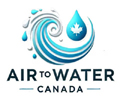 CUTS TO NOAA THREATEN WEATHER AND WATER MONITORING IN CANADA
Independent assessment prepared for Environment and Climate Change Canada by Council of Canadian Academics reports Canada’s Weather Service at a Crossroads as AI, Climate Change, and Geopolitics Reshape the Landscape
“We’re facing a critical moment for hydro-meteorological services in Canada and an opportunity to ensure that Canada’s weather service continues to serve the public interest,” --Jim Abraham, Chair of the expert panel.
The new report from the Council of Canadian Academies (CCA) on September 11, 2025, explores how the Meteorological Service of Canada (MSC) can respond to climate change, rapid technological shifts, and the evolving needs of users in Canada and globally.
WATERTODAY EXAMINES THE REPORT
Financial Constraints
Financial constraints are putting pressure on the weather service to adapt. The panel determined that strengthening and diversifying domestic and international partnerships will help resist fragmentation of services and improve the end-to-end resilience of forecasts and warnings. AI has the potential to drastically change the way weather predictions are made. At the same time, it is essential that the MSC continue to provide and maintain Canada’s backbone infrastructure, such as a country-wide observation system and modelling capabilities, which remain critical to Canada’s weather enterprise and climate change adaptation strategy.
“Weather, water, and climate monitoring and forecasting are some of the most indispensable government services in Canada,” said Tijs Creutzberg, CCA president and CEO. “This report can inform the important work of the public weather service to ensure it continues to support decision-making across sectors, communities, and industries.”
The Future of Hydrological and Meteorological Services in Canada
The MSC highlights the essential functions of Canada’s weather service in the context of key trends and considers how the delivery of these functions could be improved. The report examines how the MSC could support leadership and coordination both at home and abroad and meet evolving user needs through engagement and critical communication strategies and products.
- Three trends are changing the way hydro-meteorological services are built and delivered: (i) technological advances, particularly artificial intelligence and machine learning; (ii) an expanding information environment and global weather enterprise; and (iii) climate change, which is causing more extreme weather events that threaten the lives and prosperity of Canada and its people.
- These trends, coupled with changing geopolitical structures and financial constraints, underscore the need to improve the efficiency and adaptability of the MSC.
- Essential and foundational functions of the MSC need to be maintained. These essential functions include backbone infrastructure—such as a country-wide observation system and modelling capabilities—critical to Canada’s weather enterprise and climate change adaptation strategy.
- An effective warning system is essential for public safety. Critical communications, such as alerts about dangerous weather events, need to be clear, accurate, accessible, valuable, and of use to the intended audience.
- It is essential that the MSC lead by facilitating collaboration with the broader hydro-meteorological ecosystem—including other orders of government, private companies, NGOs, the media, and academia—and continue to maintain strong relationships with international meteorological organizations to support improved services in Canada.
- Thoughtful prioritization of the activities of the MSC, a strategic increase in the involvement of partners, a clear understanding of user needs, and responding to threats to the integrity of an increasingly complex global hydro-meteorological ecosystem are critical to ensuring high quality service.
- Updating and diversifying skills within the MSC and strengthening ongoing partnerships (both domestic and international) will help resist fragmentation of services and improve end-to-end resilience of forecasts and warnings.
- Leadership, communication, and coordination skills are as relevant to the beneficial delivery of hydro-meteorological services as are modelling and forecasting skills.
- By embracing standards, building partnerships, and taking a stronger leadership role where needed, MSC can leverage its resources to maximize efficiency and return on investment while protecting Canadian sovereignty, safety, and prosperity.
View the Full Report
Canada’s Weather Service at a Crossroads as AI, Climate Change, and Geopolitics Reshape the Landscape According to new report by expert panel by council of Canadian Academics
“Weather, water, and climate monitoring and forecasting are some of the most indispensable government services in Canada,” said Tijs Creutzberg, CCA president and CEO. “This report can inform the important work of the public weather service to ensure it continues to support decision-making across sectors, communities, and industries.”
|
|